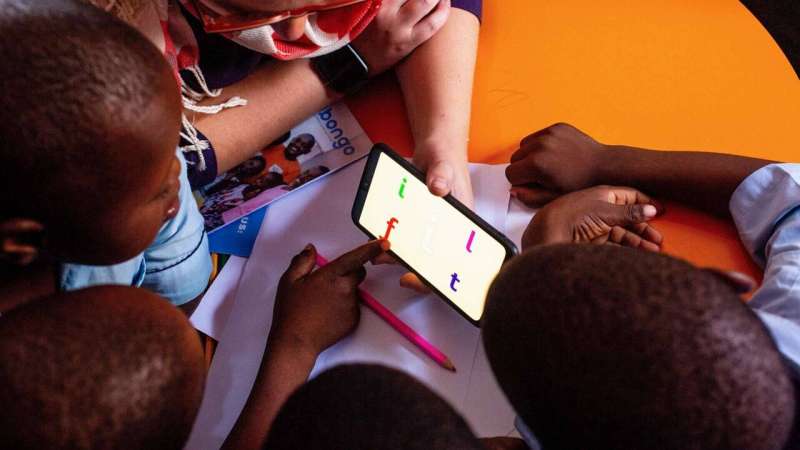This article has been reviewed according to Science X's editorial process and policies. Editors have highlighted the following attributes while ensuring the content's credibility:
fact-checked
trusted source
proofread
Educational TV in Nigeria boosted preschool readiness during pandemic, study finds

A University of Maryland study upended by the COVID-19 lockdown in Nigeria made an unexpected discovery: Preschool children who regularly watched educational television programming at home while schools were closed showed significant strides in early learning outcomes like literacy, shape recognition and social skills.
Led by global and community health Research Professor Dina Borzekowski, the study that was published last month in the Journal of Children and Media offers promising new evidence of the value of locally produced media interventions in low- and middle-income countries, particularly when manmade or natural disasters shutter schools.
"We made lemonade in this situation, and it was very surprising to have COVID actually work in our favor," said Borzekowski. "[Educational television] is not a cure-all, but it is possible to improve outcomes in school through exposure to media at home."
The research, which began in early 2020, intended to track educational gains in a small set of Nigerian preschool children exposed to selected portions of the African-produced educational TV program "Akili and Me" in a controlled, school setting, comparing them to a control group that wasn't watching the show.
But Borzekowski's team, including doctoral student Lauren Kauffman M.P.H. '20, undergraduate student Lauren Jacobs '24 and two Nigerian colleagues, was forced to pivot 12 weeks into the study when the children were sent home—and the Nigerian government offered "Akili and Me" on its free television network.
"Suddenly all of the children had access to the program," said Borzekowski. "We no longer had control of the content or who was watching. It went from a controlled experiment to a natural study."
The researchers' data collection before the lockdown provided a baseline for literacy, numeracy, shape and color recognition, social-emotional skills and more. When the team reassessed the children a year later, they discovered similar skill gains among the show's regular viewers—defined as those who knew the names of at least four characters from the show.
"If they can recall the characters, we know they are paying more attention to all of the content and retaining more from the show," said Jacobs. "And this includes the messaging, such as math and literacy."
Critical to the success of educational media in developing countries is its locality, said Borzekowski. "Akili and Me" was specifically created in Hausa, the most widely spoken of Nigeria's native national languages, and offered characters with the same skin tones and environments, including music, dress, culture and even what the characters eat.
"The main character is a little girl trying to learn language, numbers, handwashing, and just navigate the world—and all of that familiarity is meaningful to the everyday lives of the viewers and helps facilitate these gains," she said.
Research has proven that educational technology and media can result in better school readiness and performance compared to children exposed to regular programming. Yet youngsters in many developing nations lack access to educational programming. During the COVID-19 pandemic, students in low- and middle-income countries lost approximately four months of schooling, while those in high-income countries lost around six weeks.
Borzekowski, who has centered her research in developing countries, said the link between thoughtful, culturally sensitive programming and learning outcomes is encouraging, but more research is needed. A study in Kenya with another of her undergraduate students is exploring the portrayal of characters with disabilities in children's educational programming, an endeavor that if done incorrectly can create fear and exclusion, she said.
"There are still a lot of unanswered questions when it comes to media exposure and children," she said. "And it's a really nice opportunity for students to get some applied experience."
More information: Dina L.G. Borzekowski et al, How the COVID-19 shutdown revealed the effectiveness of a northern Nigerian educational media program, Journal of Children and Media (2023). DOI: 10.1080/17482798.2023.2222187
Provided by University of Maryland





















